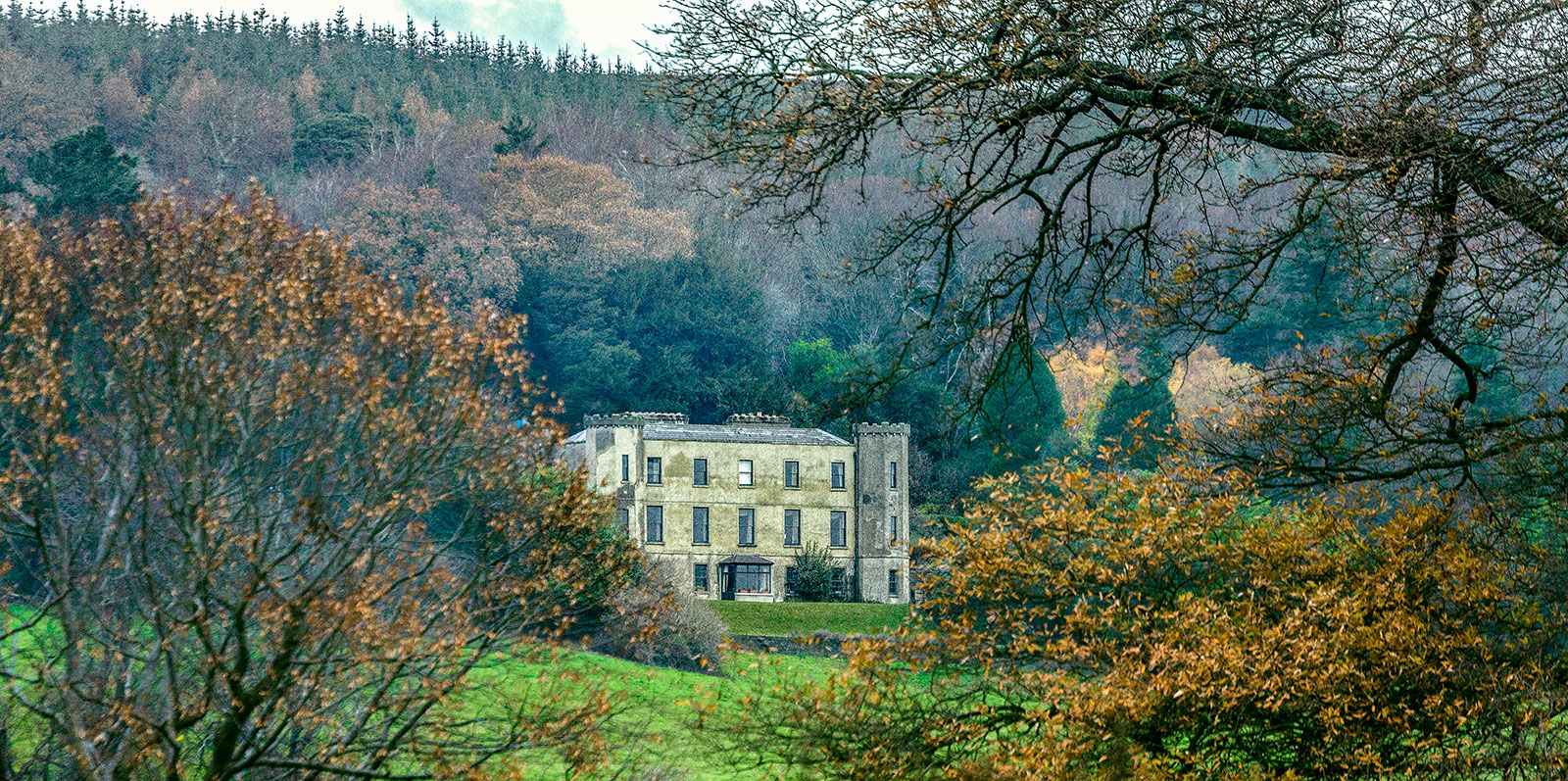Altidore Castle
Altidore was built as a residence for General Thomas Pearce, uncle of the Surveyor General Sir Edward Lovett Pearce, in about 1730. Sir Edward designed some of Ireland’s finest early Palladian buildings and architectural historians speculate that he may well have been responsible for the design of Altidore. It is clearly in the same vein as the early 18th century ‘toy forts' and castles designed by Pearce and his cousin, the English playwright turned architect Sir John Vanbrugh. It should be compared with Arch Hall in County Meath and Wardtown in County Donegal, both now in ruins. Built beside a medieval castle of the O’Toole family, on the eastern slopes of the Wicklow Mountains, north of Newtownmountkennedy, the castle looks out over wooded parkland to the coastal plain and the Irish Sea beyond.
The house is of two stories over a basement, with crenellated half-hexagonal towers at each corner and two formal fronts of five bays. The façade, which faces the mountains, has a three bay breakfront with a central Venetian window above a heavily blocked door case and a later pillared porch. The basement appears as the ground floor at the rear, on account of the steeply sloping ground. The interior has good early 18th century joinery and a paneled dining room with later plaster plaques.
Altidore was enlarged and modified for a subsequent owner, Major Henry Brownrigg, and by 1773 was owned by Rev William Blachford, Librarian of Marsh’s Library and father of the early Romantic poetess Mary Blachford Tighe, authoress of “Psyche, or the Legend of Love” who lived at Altidore as a child. Subsequently her brother, the noted agriculturalist John Blatchford, lived here with his wife Mary Anne, the daughter of Henry Grattan, the famous Parliamentarian from nearby Tinnehinch.
From 1834 to 1918 the Dopping-Hepenstal family, extensive landowners in County Wicklow, owned the estate. They rarely lived in the castle and leased it for long periods, on one occasion for use as a tuberculosis sanatorium.
In the early twentieth century Altidore changed hands more frequently and was owned by two different banks on separate occasions. Finally, in 1945, James Albert Garland Emmet purchased the house on three hundred acres from Percy Burton, an eccentric bachelor who had allowed it to become very dilapidated. The Emmets carried out an extensive restoration and created a large new garden, centred on a pair of canals from the early 18th century garden layout. The present owners, their grandson Philip and his wife Vicky, have farmed the estate organically for nearly 20 years.
The Emmet family descends from the United Irishman Thomas Addis Emmet, elder brother of the patriot Robert Emmet. Arrested in 1798, Thomas was released four years later on condition that he would never again return to Ireland. He first moved to France but left with his family for New York in 1804. The family remained in America for many years, and did not return to live in Ireland until 1927. Altidore contains a small Robert Emmet museum, with a number of interesting original items.
Address & Contact
Altidore Castle, Kilpedder, Wicklowt: +353 87 7601369
Available as a Film Location
Houses and Garden
Individual House Visits
Groups by Arrangement
Individual Garden Visitors
Culture and Education
Museum
Concerts, Plays or Recitals
Educational Visits
Accommodation and Short Breaks
Holiday Cottages
Opening Details
House and Garden Open
1 pm to 5 pm
March 3, 4, 5, 6, 7, 8, 9, 10, 11, 12, 13, 14, 15, 16, 17, 18, 19, 20, 21, 22, 23, 24.
May 3, 4, 5, 6, 7, 8, 9, 10, 11, 12, 13, 14, 15, 16, 17, 18, 19, 20, 21, 22, 23, 24, 25, 26, 27, 28, 29, 30, 31.
June 1, 2, 3, 4, 5, 6, 7.
1pm to 5pm
August - National Heritage Week
August 17, 18, 19, 20, 21, 22, 23, 24, 25.
2pm to 6pm
Admission: 10 euro, concessions 5 euro
Groups by arrangement at anytime of year
Robert Emmet Museum


